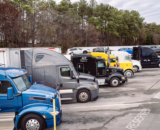The Edison Electric Institute recently announced that the Electric Highway Coalition and the Midwest Electric Vehicle Charging Infrastructure Collaboration joined to form the National Electric Highway Coalition. The new coalition consists of more than 51 investor-owned electric companies, one electric cooperative, and the Tennessee Valley Authority with the goal of providing a national EV charging network by 2023. Current coalition member companies collectively serve nearly 120 million U.S. electric customers across 47 states and the District of Columbia.
NATSO thinks fuel retailers provide the best opportunity for advancing alternative fuels, including electricity, into the marketplace and that power companies and fuel retailers should focus where each is most productive.
Utilities and power companies are best suited to perform the necessary generation development and power grid restructuring work through their regulated monopoly; however they should not be given a leg up over private companies seeking to enter the market for electric vehicle charging infrastructure that consumers use to power their vehicles.
While the coalition’s goals are purposefully broad, NATSO expects that many of the coalition’s members will seek to expand and establish a nationwide network that largely relies on charging its rate base, regardless of whether they drive an EV, to recoup their costs required to upgrade site infrastructure and to own and operate EV charging stations.
The U.S. Department of Transportation is working rapidly to implement the Infrastructure Investment and Jobs Act (IIJA). The bipartisan $1.2 trillion infrastructure bill signed into law in November 2021 carved out $7.5 billion to expand the nation’s electric vehicle (EV) charging network. From that pot of money, $5 billion will be distributed to the states via the Federal Highway Administration’s (FHWA’s) funding formula. FHWA will distribute the remaining $2.5 billion via a competitive grant program for charging and fueling Infrastructure to strategically deploy publicly accessible EV charging infrastructure (as well as hydrogen, propane, and natural gas fueling infrastructure) along designated alternative fuel corridors.
With federal dollars available to both the public and private sector, NATSO expects a flurry of activity over the next few months as debates begin in the state legislatures and regulatory bodies. NATSO will continue to monitor these activities.
Subscribe to Updates
NATSO provides a breadth of information created to strengthen travel plazas’ ability to meet the needs of the travelling public in an age of disruption. This includes knowledge filled blog posts, articles and publications. If you would like to receive a digest of blog post and articles directly in your inbox, please provide your name, email and the frequency of the updates you want to receive the email digest.

